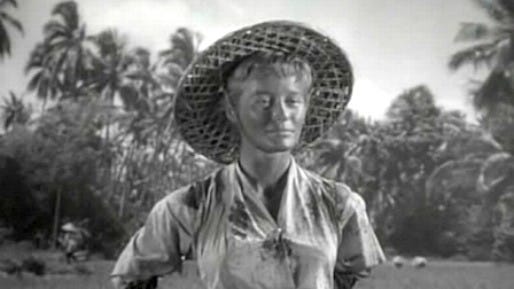A Town Like Alice (1956)

"A Town Like Alice" is a historic romance in which the romantic relationship is the least successful thing about the movie. Virginia McKenna and Peter Finch in fact spend less than 15 minutes of screen time together. It is her character's tremendous struggle to survive as a Japanese prisoner of war that drives the narrative. Her hooking up with an Australian soldier is merely a sidebar.
Maybe it's because this 1956 movies based on Nevil Shute's novel actually truncates the story to only focus on Jean Paget's experiences during and immediately after the war, ending with her reuniting with Joe Harman back in his hometown that gives the film its name. The book went on to chronicle her experiences starting a raft of businesses that revitalized that area's economy.
Indeed, it was probably a mistake to keep the title of the movie the same as the book, since thematically they're on opposite sides of the same canoe. Heck, if it was up to me I would've ditched the Peter Finch part entirely.
I say this not because I'm contemptuous of the film but because I think the rest of it is so strong that it doesn't really need the romance part. It ends up dragging the story down more than lifting it up. McKenna received the BAFTA Award for Best Actress, and well-deserved it was. Her performance is a knockout. Finch won the Best Actor prize, which seems out of place for what is obviously a supporting role.
"Alice" is notable for being one of the very first depictions of female POWs that was unflinching in how harsh the conditions were and how uncaring the Japanese soldiers (for the most part). It must have been quite a thing for midcentury audiences to watch finely mannered English ladies being forced to sweat and scrape through the jungles of Malaya.
The story opens with Jean and the rest of her office being evacuated as a result of the Japanese invasion. She lingers behind to help her boss' wife with their children and ends up escaping with them in their car. But they're trapped in a local seaside town because all the transport boats have already departed, and they're captured.
The men are rounded up and sent off by truck to a POW camp. The Japanese have little use for the women and children, so they're sent marching across the countryside with an elderly sergeant (Kenji Takaki) in tow. No prison commander will take them in, and they end up trudging to and fro for months on end, slowly dropping off like flies.
Director Jack Lee is unflinching in his portrayal of their suffering, including shots of little children taking their last breath, which must have been quite controversial at the time. He's also extraordinarily successful at creating a mood of sweltering, oppressive environs. We can practically feel the jungle closing in on the wayward little troupe of women.
At one point, they stumble upon Joe and his buddy, who are Australian POWs in charge of driving supplies up and down the main roads. They arrange for several convenient breakdowns of the truck so he can spend time with Jean, sharing a cigarette and telling her about his lonely home in the middle of the outback.
Later, Joe steals chickens from the prison commander's private coop and gives them to the women for food. He's soon caught, as he must have known he would be, and literally crucified for his crimes. Jean thinks him dead, but he actually survives the ordeal, setting up their big reunion to end the film.
The depiction of the Japanese is about typical for this era. Several of the officers wear those big round Coke bottle glasses that, for some reason, became an icon of anti-Japanese propaganda. They're generally shown as incredibly proud, egotistical and Napoleonic in their desire to subjugate these tall, imperious British ladies.
The sergeant, though, is portrayed as sympathetic and humanized, attempting to rescue one of the small boys from a snake. At some point, he morphs from being their guard and leader to something more than a chaperone, following the women around in their wayward odyssey.
I really enjoyed everything about "A Town Like Alice" except for the part that it purported to be all about.
4 Yaps



